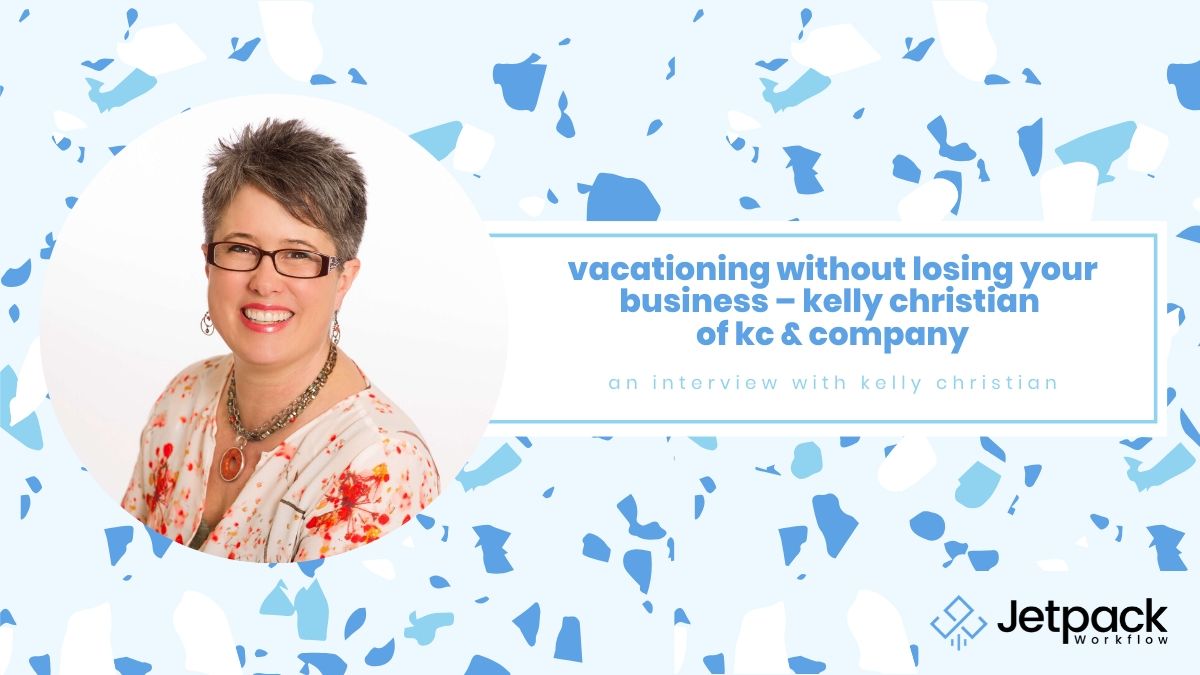Vacationing Without Losing Your Business – Kelly Christian of KC & Company

Welcome to another episode of Growing Your Firm from Jetpack Workflow. This week we’re talking with Kelly Christian, owner of KC & Company. She and her husband were able to change their business from an offline business focusing on small-town clients in Canada into a thriving and growing online business that lets them escape the Canadian winter by traveling to Mexico without losing customers.
How did she do it? Kelly will explain what she did in the summary below, but it is a masterclass on topics we’ve covered in the past, including niching down your clients, cutting clients that don’t serve your needs, leveraging technology, and so much more. We’re thankful for the time that Kelly shared with us. And if you need Canadian tax services, check out her website in the resources.
In this episode of the Growing Your Firm Podcast, David Cristello and Kelly Christian discuss:
- Why Kelly needed to change her business model in order to grow
- What she discovered by niching down her business
- How she approached groups to find her niche and gain new clients, and what happened when she hit the tipping point
- Her experience with location independence in Mexico during winter
- And much more
Additional Links:
- Kelly Christian’s website: http://kellychristianandcompany.com/
- Her Facebook page: https://www.facebook.com/kellychristianandcompany/
- Amber McCue’s website: https://www.ambermccue.com/
How I Spent Winter Where It’s Warm
I’m from Canada. Specifically a small resort town near Shuswap Lake. The nearest major city is Vancouver about five hours south of me. Despite living in this small town, my husband and I managed to escape down to Mexico for the winter for two months while still running our business. Here’s how we shaped our firm so we were able to do this.
First, I want to make it clear that this was a working vacation. Yes, I was at a warm and sunny beach location, but I was still working four days a week at least 6-7 hours a day. But my desk overlooked the ocean view and I was out of the terrible Canadian winter. Plus, I had the beach right there waiting for me in the afternoon where I could enjoy happy hour and some sun.
This was a specific vision that I had and it was this vision that kept me going as I made all the transitions to a location-independent bookkeeping business. It’s not enough to say that you want to be location independent. You need a specific vision to keep you motivated. Why? Because gaining location independence forced med to change my marking, my client base, my client communications and expectations, and so much more. It’s a huge mindset shift.
Where I Started
As a small-town bookkeeper, I started out working with a lot of mom-and-pop businesses around town. My company became popular, but I soon tapped out the market. I had to find other ways to grow and I couldn’t just hop into a car and go into the next town. It would have been an hour drive each way to serve those clients and that didn’t make economic sense.
So I had to do some market research on how I could gain clients purely online. I got sucked down a rabbit hole of study trying to figure out how to go paperless and discovered that there was a huge need for someone who knew Canadian sales tax issues, which are far more complex than American sales taxes.
I also worked with a business mentor, Amber McCue, who really helped me figure out my niche and who my ideal clients were so I could focus my business. I ended up ecoming a go-to person for Canadian sales tax issues.
It took me a couple of years to really focus down as much as I needed to before jumping into location independence. A lot of companies start out severing everybody because they don’t know who they want to work with. But when you figure out your niche and your ideal client, your marketing becomes far simpler.
Digging Into A Niche
One of the reasons it took so long to niche down is because I had to build relationships online like I had built relationships with my local community. The beauty of online groups is that you can share other passions and just happen to be a bookkeeper or an accountant. It’s much easier to connect with others on a shared passion outside of your core business than to just go to networking meetings over and over again, the old way of doing things.
You absolutely cannot wade into a group and try to sell directly to them without building a relationship. You have to become part of the community first before you sell. It does not go well and you will get slammed, possibly even banned from the group. You will get called out. Instead, grow your relationships organically.
So how do you cross that boundary? I participated in the community and kept my ears open for questions that I could answer. That let me demonstrate my knowledge and get on their radar that I could help them with other accounting issues. By doing this, over time, I was able to transition my client base from offline businesses to online businesses.
Don’t Fear Losing Customers
There was a fear that I would lose a lot of business focusing on just the Canadian market. Instead, I gained about 50% more business by declaring a focus. When I would introduce myself on online groups as someone who focused on Canadian tax issues, I got a lot of business from the United States as well because a lot of accountants there didn’t want to mess with the Canadian tax system. But for me, the United State tax system is much less complex compared to the Canadian one, at least for sales tax issues.
And when I started to grow from this, I had to make hard decisions to cut clients who weren’t part of our new focus. They weren’t serving our new vision. Granted, this is a lot easier when you have business waiting in the wings, but sometimes you have to cut out the old to make space for the new.
Training Customers On Technology
Once I had my niche locked in, I could tackle the next piece of the location independence puzzle. Many businesses still run on paper and that requires bookkeepers to make trips to pick up that paper so they can do the books. But we have all this technology now for capturing that information. There’s no way I could have left for two months if I still had to pick up receipts!
So I had to train my clients to be less reliant on me and to use tools to do a lot of the heavy lifting. This was challenging, especially for my older clients who were tech-adverse. We also had to gather clients who understood that their bookkeeper could leave for three months and not destroy their business. This is why we often work with online entrepreneurs, who often have dreams of location independence. And what’s really cool is that our dreams of independence intersect, so it makes it really easy to work with them.
It’s really important to have the technology piece in process while you’re hunting up your niche clients as well. I had the unfortunate experience of not doing this. We gained about 6-7 clients in January, right in the middle of tax season and I didn’t have the assistance to carry out the workload. I lost several of those clients in the next three months because I got too much attention. So get your workflows in place while you’re building relationships.
Location Independence Is Possible
To sum up, here are the core things my company had to do in order to become location independent:
- Decide what location independence looked like for us
- Figure out exactly who we wanted to serve
- Build relationships with those people and cut those who weren’t aligned with our vision
- Create workflows that enabled us to move our clients online
- Train our clients to use our tools so we didn’t have to be present
If you listen to the full podcast, I have plenty of other tips, but we’re quickly running out of space! Remember that location independence takes time. It took a few years of thinking and working to get to this point. But it was all worth it when we could dodge winter for once.
RELATED ARTICLES:





